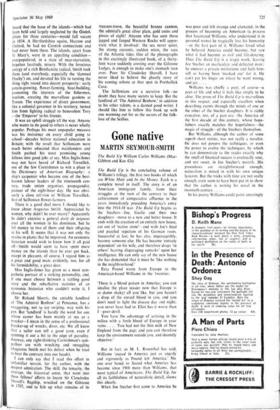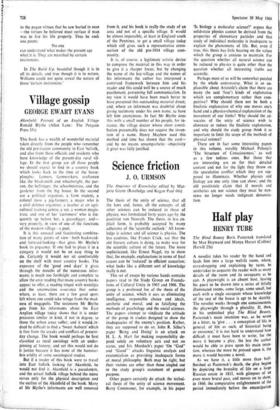Gone native
MARTIN SEYMOUR-SMITH
The Build Up William Carlos Williams (Mac- Gibbon and Kee 42s) The Build Up is the concluding volume of Williams's trilogy, the first two books of which are White Mule and In the Money. Each is a complete novel in itself. The story is of an American immigrant family, from their struggles at the turn of the century to their achievement of comparative affluence in the years immediately preceding America's entry into the 1914-18 war. The Build Up begins as the Stechers—Joe, Gurlie and their two daughters—move to a new and better house. It ends with the creation of an entirely new house, cut out of 'native stone'—and with Joe's final and puzzled rejection of his German roots. Successful at last, he has also, imperceptibly, become someone else. He has become 'entirely dependent' on his wife, and therefore drops 'in others' hearing disparaging remarks' upon her intelligence. He can only say of the new house she has demanded that it must be 'like nothing in the neighbourhood.'
Ezra Pound wrote from Europe to the American-based Williams in the 'twenties: 'There is a blood poison in America; you can idealise the place (easier now that Europe is so damn shaky) all you like, but you haven't a drop of the cursed blood in you, and you don't need to fight the disease day and night; you never have had to. Eliot has it worse than 1—poor devil.
You have the advantage of arriving in the milieu with a fresh blood of Europe in your veins . . . . You had not the thin milk of New England from the pap; and you can therefore keep the environment outside you, and decently objective.'
But in fact, as M. L. Rosenthal has said, Williams 'stayed in America just as angrily and vigorously as Pound left America.' No one ever hated or feared what America has become since 1900 more than Williams, that most typical of Americans; The Build Up, for all its faithfulness of naturalistic detail, shows this dearly.
When Joe Stecher first came to America he was poor and felt strange and alienated; in the process of becoming an American (a process
that fascinated Williams, who understood it in personal terms) he tragically lost his humanity —or the best part of it. Williams loved what he believed America could become, but saw what it had become as evil and life-denying. Thus The Build Up is a tragic work, leaving Joe Stecher an inarticulate and defeated man : he endures a private misfortune and feels him- self as having been 'marked out' for it. He can't put his finger on where he went wrong, and yet ....
Williams was chiefly a poet, of course—a poet of life and what it feels like simply to be alive. The prose of The Build Up is marvellous in this respect, and especially excellent when describing events through the minds of one or the other of the Stecher daughters. It is richly evocative, too, of a past era—the America of the first decade of this century, whose hope- fulness exactly matches the hopefulness—the magic of struggle—of the Stechers themselves..
But Williams, although the author of some superb short stories, was not really a novelist. He does not possess the techniques, or even the power to evolve the techniques, by which he can demonstrate to the reader exactly why the smell of financial success is eventually sour, and not sweet, in Joe Stecher's nostrils. His procedures are straightforward enough; naturalism is mixed in with his own unique lyricism. But the tricks with time are not really enough, even seem to have been put in to show that the author is writing his novel in the twentieth century ....
In his poetry Williams could point unerringly to the pagan virtues that he saw buried in man —the virtues he believed must surface if map was to live his life properly. Thus he ends one poem: No one can understand what makes the present age what it is. They are mystified by certain insistencies.
In The Build Up, beautiful though it is in all its details, and true though it is to nature, Williams could not quite reveal the nature of those 'certain insistencies.'



































 Previous page
Previous page